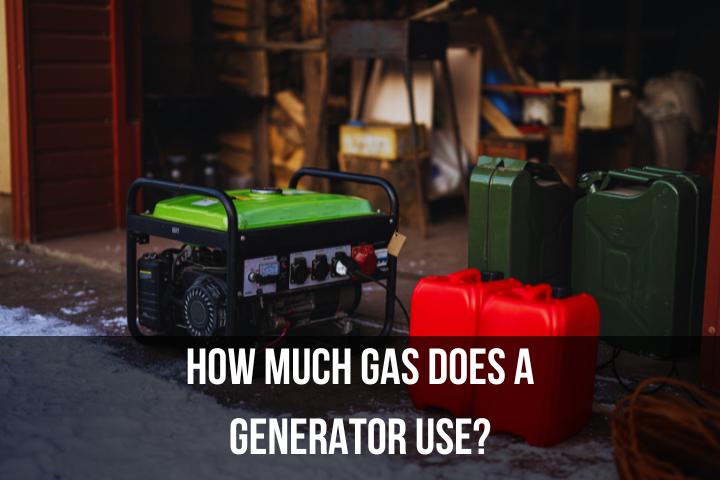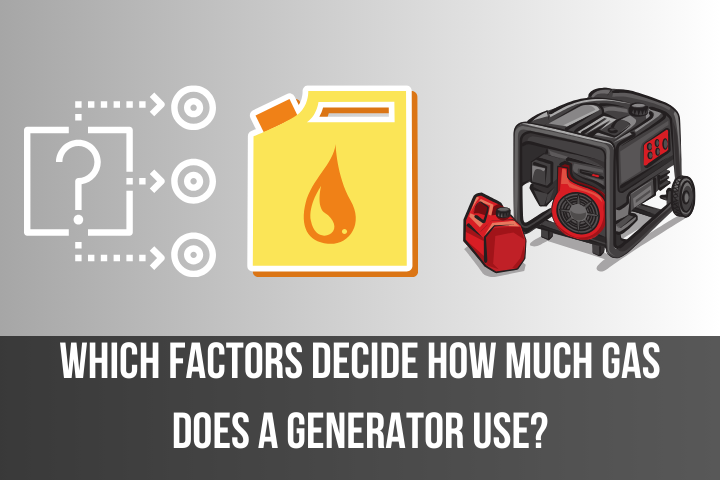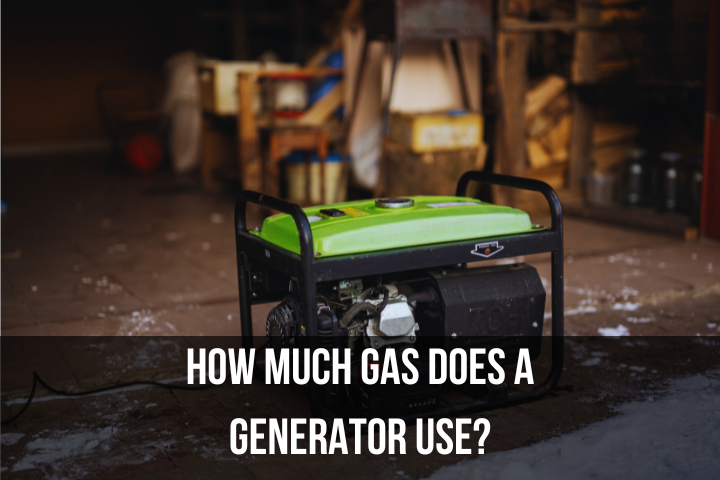Knowing how much gas a generator uses is super important for any generator owner. It gives you an idea about how much fuel you will have to purchase and how much money will be spent.
But the thing is- the answer to the gas consumption question is not simple.
How much gas a generator uses depends on machine type, load, condition, and runtime. In most cases, a 5kW generator burns around 0.75-0.80 gallons every hour at full load and 0.30 to 0.60 gallons at half.
Want more info? Then, stay tuned as I explain the generator’s gas consumption with real examples and charts. As a bonus, you will learn how to optimize the gas burning and keep your generator running for hours. So, continue reading!
Table of Contents
How Much Gas Does a Generator Use?

How much gas a generator uses depends on different factors like generator type, fuel choice, maintenance, and a few other things. Therefore, it is nearly impossible to predict the exact gallons of fuel.
Luckily, you can still predict an approximate number, and I am now discussing how.
How Much Gas Does a Generator Use in an Hour?
On average, a 5kW generator consumes 0.75 gallons of gas per hour at 100 percent load. However, note that the machine uses more fuel when it runs on full load. So, chances are it might burn more than 0.75 gallons.
But if you run a 2.5kW load on a 5kW generator (50 percent), then it will consume around 0.30 to 0.60 gallons of gas every hour in most cases.
How Much Gas Does a Generator Use in a Day?
Calculating how much gas a generator uses in a day is super easy. Let’s say you run your gas generator for 8 hours a day. Then, you will have to multiply the per-hour consumption by 8.
For example, as I mentioned above, a 5kW generator consumes around 0.75 gallons of gas. Now, multiply it by 8, and you will have how much gas a generator uses in a day- which is 6 gallons.
Similarly, if you use your gas generator for about 12 hours, then multiply 0.75 by 12, and the answer will be 9 gallons.
The same goes for 50 percent load (2.5kW). If your generator consumes 0.50 gallons per hour at half load and you have to run it for 8 hours, then the total gas it will use will be 4 gallons.
I know everything is a little “mathematical,” but it is not hard. You can easily calculate how much gas a generator burns once you get used to it.
Real-Life Generator Gas Consumption Examples
People use generators for three things- home backup, outdoor trips, and powering off-grid/construction sites.
Now, I am discussing all three of them with real examples and a chart at the end.
Residential Backup Generators
Calculating the gas consumption of residential backup generators is pretty straightforward. Here is the scenario I’ve set:
- Generator Type: Home standby generator (Natural Gas or Propane)
- Size: 20 kW
- Load: Running at 50 percent capacity (10 kW load)
- Runtime: 24 hours
- Fuel Type: Natural Gas or Propane
Let’s say that a 20 kW home standby generator runs at a 50 percent load. According to my knowledge, it will consume around 2.5 to 3.5 cubic feet of natural gas. If you add propane, it will burn around 1.2 to 1.5 gallons per hour.
Over 24 hours, it would consume approximately:
- 60 to 84 cubic feet of natural gas
- 28.8 to 36 gallons of propane.
RV and Camping Generators
People take portable generators on outdoor trips like camping. These generators are compact and usually fuel-efficient.
Here’s the scenario:
- Generator Type: Portable Inverter Generator
- Size: 3 kW
- Load: Running at 75 percent capacity (2.25 kW load)
- Runtime: 8 hours per day
- Fuel Type: Gasoline
Let’s say that a 3 kW portable inverter generator runs at 75 percent load. According to my experience, it will consume around 0.3 to 0.5 gallons of gasoline per hour.
In 8 hours, it would consume approximately 2.4 to 4 gallons of gasoline (your average per day consumption estimate).
Construction Site Generators
Calculating the gas consumption of construction site generators is a little difficult, but don’t worry. I’m making it easy for you with my example. Here’s the scenario:
- Generator Type: Towable Diesel Generator
- Size: 100 kW
- Load: Running at 80 percent capacity (80 kW load)
- Runtime: 10 hours per day
- Fuel Type: Diesel
Let’s say that a 100 kW towable diesel generator runs at 80 percent load. In most cases (that I have witnessed), it consumes around 8 to 12 gallons of diesel fuel per hour.
Over 10 hours of daily runtime, it is easy to estimate that it will burn approximately 80 to 120 gallons of diesel fuel.
Here’s the chart:
|
Generator Type |
Size (kW) |
Load (% Capacity) |
Runtime (hours/day) |
Fuel Type |
Gas Consumption per Hour |
Gas Consumption per Day (Runtime x Consumption) |
|---|---|---|---|---|---|---|
|
Residential Backup |
20 kW |
50% (10 kW) |
24 hours |
Natural Gas/Propane |
2.5 – 3.5 cu ft or 1.2 – 1.5 gal |
60 – 84 cu ft or 28.8 – 36 gal |
|
RV/Camping |
3 kW |
75% (2.25 kW) |
8 hours |
Gasoline |
0.3 – 0.5 gal |
2.4 – 4 gal |
|
Construction Site |
100 kW |
80% (80 kW) |
10 hours |
Diesel |
8 – 12 gal |
80 – 120 gal |
The only problem you will face is the per-hour consumption of generators may keep on changing. The reason is that it is affected by a lot of factors, and I am now explaining each of them.
Which Factors Decide How Much Gas Does a Generator Use?

How much gas a generator burns usually depends on the type and load. Run time and maintenance can also impact gas consumption in some cases. A few additional features can also affect gas use too.
Type of Generator You Have
The biggest factor that decides how much gas a generator uses is which type of machine you own. Inverter generators use less fuel than other ones, and I also recommend these to everyone.
The reason is that the inverter is the latest technology that is engineered to burn less fuel than others.
Fuel Type
Fuel type is another factor to look for when deciding how much gas a generator uses. Every fuel has different energy densities. For example, Diesel has a higher density than gasoline, which means it is less consumed during the operation.
Therefore, I always say that gasoline generators are not suitable for powering bigger homes and commercial sites.
You must now be thinking- what about natural gas? Well, the thing is- natural gas also has a lower energy density than diesel, which means it burns more quickly. However, there is still no problem with powering bigger buildings with natural gas because the supply is continuous.
Those who own dual-fuel generators also want to know how longer they can run their machines on propane. Luckily, propane has better energy density than natural gas and gasoline. So, your generator can run for longer hours with less fuel.
Load
Those who get a generator for the first time don’t usually know that gas consumption also depends on the load. Well, remember these words:
- More load means more fuel burning.
- Less load means less fuel burning.
Why? It’s simple- if a generator has to bear more load, it needs to provide more power. In doing so, it consumes more gas. Contrarily, if a generator does not have to power up many big appliances, it will generate less energy. For this, it does not need much gas, which means the fuel consumption will be low.
In my experience, most generators perform well when the load is between 50 to 75 percent. Running it within this range will ensure two things:
- Fuel efficiency
- Better overall performance.
Run Time
It sounds obvious, but let me explain to you how run time also influences gas consumption. If you run your generator for 4 hours, it will consume less fuel (let’s say 2 gallons if the load is 50 percent).
But if you power appliances with your generator for 8 hours at 50 percent load, it will burn around 4 gallons.
Maintenance and Condition
A generator that is maintained well performs better fuel burning than the one that is in bad condition. By well-maintained, I mean these things:
- It must be rust and corrosion-free.
- There should not be any wear and tear.
- All the components are working smoothly.
- You have changed oils timely and kept the filters clean.
Such generators cleanly burn fuel, which means they need less gas.
Additional Features
A generator that has the latest features consumes less fuel than others. For example, if you own a machine that has an idle control system, then it will burn less gas because the idle control feature keeps adjusting the engine’s RPM.
Similarly, if a generator has smart load sensing technology, then it will also use less gas as this feature can automatically detect the power demand and help the generator adjust accordingly.
So, these are the total factors that impact how much gas a generator uses. Now, it’s time you learn how you can optimize fuel efficiency and keep your generator running for hours.
Related: 3000 Watt Generator What Will It Run? (Find Out)
How To Optimize Generator Fuel Efficiency?

To optimize a generator’s fuel efficiency, you should first get the right machine and implement load management techniques. It is also crucial to regularly maintain the device to ensure it keeps on working smoothly. Investing in energy-efficient appliances is also a smart thing to do!
Right-Sizing Your Generator
It is important you get a generator that matches your power requirements. If you own energy-consuming appliances like an air conditioner, then you must get a bigger generator too. If you try to run them on a smaller machine, it will quickly burn the gas and power down.
Load Management Techniques
You should also manage the load if you want to optimize the gas consumption. Here’s what I recommend:
- Use more than one generator if you own bigger and energy-demanding appliances.
- When you power on appliances like the refrigerator, it is better to turn off any other unnecessary ones to avoid overloading.
- Follow the “load-shedding” technique. In this, you run your generator for an hour, then turn it off for about 30 to 35 minutes.
- You should shut down the generator when you are not using it.
- Get help from solar and wind energies to free yourself from the dependency on gas.
- Keep monitoring the load and note the real-time energy consumption data to make a better strategy for the future.
Regular Maintenance for Peak Performance
Well-planned maintenance can improve fuel efficiency and keep the generator running for more hours. It involves a combination of different things, which are:
- Make a scheduled inspection. Inspect your generator twice a week to see if there are any issues with the engine and other components.
- Timely change the oil to ensure no friction occurs within the engine parts.
- Clean the filter regularly and change it if it gets damaged.
- Keep the fuel lines clean to avoid oil contamination.
- Dry your generator every time water or liquid spills on it.
- Make sure ventilation is sufficient, or else overheating can occur.
Doing these things will improve fuel efficiency, which means less gas will be used.
Invest In Energy Efficient Appliances
I also recommend you replace your old appliances with the latest and energy-efficient ones. Start with cheaper things, like light bulbs. You should get an LED bulb that uses less power/wattage to run.
After this, replace your fans and then home appliances like a coffee maker.
Gradually buy all the energy-efficient appliances. It will ultimately lower the burden on your generator, and its fuel consumption performance will also improve.
That’s all about how you can optimize the gas consumption of your generator and keep it running for more hours (than usual).
Related: How Long Can a Generator Run? (Exact Run Time)
Final Words
All in all, how much gas a generator uses depends on several factors. These are generator type, load, maintenance, run time, and additional features. On average, a 5kW generator on full load consumes 0.75 gallons of gas per hour. At 50 percent, it burns around 0.30 to 0.60 gallons.
To calculate it per day, multiply the number by the running hours. For example, if you use a generator for 8 hours, then it will consume around 6 gallons of gas per day.
Fortunately, you can optimize gas consumption by right-sizing your generator, doing maintenance, and investing in energy-efficient appliances.

